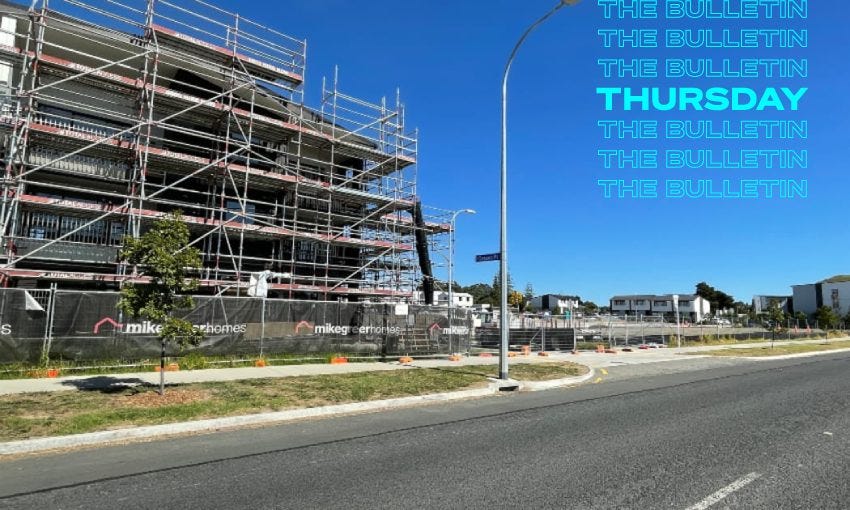$15.8m paid to one motel via emergency housing grants
The government is emphasising its building programme as emergency housing grants total over $1b in five years but construction costs are rising at the fastest pace on record.
Mōrena and welcome to The Bulletin for Thursday, July 21, by Anna Rawhiti-Connell. Presented in partnership with Z Energy.
In today’s edition: heat waves a “not if but when” for NZ; the PM acknowledges challenging times for local government; the age of anti-ambition; but first, the costs and challenges of social housing.
Kāinga Ora is building 10,000 new houses in Māngere over the next 10-15 years. (Photo: RNZ/LDR / Justin Latif)
$15.8m paid to one motel via emergency housing grants
Three weeks ago, it was revealed that the government has spent $1.2b on emergency housing grants in the last five years. New figures from Stuff’s Andrea Vance show the Ministry for Social Development (MSD) paid out a total of $788m to house 37,887 people between March 2020 and July 2022. When the $1.2b figure was reported, it was noted that a large proportion of that had been paid out to motels. The Herald’s Isaac Davison (paywalled) had a breakdown of that in June. Yesterday, Vance reported on one motel in Manukau that has been paid $15.8m to shelter 621 people, all clients of MSD.
“Get rich scheme for motel owners”
National’s spokesperson for housing, Chris Bishop, has previously called the expenditure “a get-rich-quick scheme for motel owners”, saying the government “has washed their hands of the problem of people on the state house waiting list”. At the end of May, there were 27,000 people on the waiting list. A cut to funding last year that allowed social housing providers to lease existing private sector properties has left providers like the Monte Cecilia Housing Trust in Auckland struggling to provide homes for families who need transitional housing.
Project underway to cut build times
Minister for housing Megan Woods has responded to the figures and criticism of the funding cut to social housing providers by pointing to an emphasis on building new homes rather than always buying or leasing accommodation. As Stuff’s Dileepa Fonseka reports, Kāinga Ora is currently embarking on work to speed up the process of building new homes. Project Velocity, as it’s called, has so far cut the time it takes to actually get shovels into the ground down from 18 months on one project to two months. The need for speed is obvious, with cities like Rotorua anticipating the area will still require emergency housing for at least another five years.
Kāinga Ora’s debt predicted to be $3.7b more than forecast
Like anyone trying to build anything at the moment, Kāinga Ora is not immune to rising construction costs, a tight labour market and supply chain issues. Stuff’s Miriam Bell reports this morning that construction costs are rising at the fastest pace on record. BusinessDesk’s Greg Hurrell reported last week that Woods had received a briefing from the Ministry of Housing and Urban Development to reject new funding requests from Kāinga Ora as the agency faces an unmanageable debt blowout. Kāinga Ora’s debt was predicted to reach $20.1b by 2026, $3.7b more than earlier forecast. The briefing said costs had increased at a greater rate than revenues received. Hurrell reported in late June on a hiring freeze at Kāinga Ora (paywalled) due to soaring building costs and supply chain delays.
Z Energy’s community fundraising programme Good in the Hood is back and will give away $1 million to local charities and community groups across Aotearoa. Each of Z’s 193 service stations will choose four different local organisations to support, giving away $4,000 at every site. Customers vote for their favourite local group by putting an orange token in one of the four boxes and the money is split based on the votes. If you’re helping people in need or the environment, apply now to be a part of Good in the Hood. Applications are open now until 31 July 2022. (Sponsored)
The prime minister on Three Waters reform: “the status quo can not be maintained”
Prime minister Jacinda Ardern addressed the Local Government New Zealand (LGNZ) conference yesterday and acknowledged it was a difficult time for local government with substantial reforms required across a range of areas. Ardern addressed the Three Waters reforms, saying the status quo can not be maintained because it could mean ratepayers being faced with bills of up to $9000 per household. Three mayors in the lower South Island have backed continuing to be involved in the working group advising the government on the reforms ahead of local government elections in October. Gore District mayor Tracy Hicks says being in the tent is the most productive way to influence change.
Heat waves here not a matter of if, but when
As the heat wave in Europe continues and The Sun runs “Hellfire” as its headline on the hottest day in recorded history in the UK, the Herald's Georgina Campbell has a wake up call for us. Campbell has spoken to NIWA meteorologist Ben Noll, who says New Zealand will very likely see temperatures in the 40s in the future, although we won’t necessarily be hit by heatwaves this summer just because the United Kingdom is. Noll did say that if oceans continue to be warmer than average, then we could be in for intense heat this summer. The first six months of 2022 have been New Zealand’s 2nd warmest on record, sitting 1.2˚C above the long-term average from January to June.
Click and collect
Rugby drama carries on as the meeting that was tipped to happen yesterday did not go ahead.
Residents of Taumarunui have been without internet for two days and counting after a fault with the area's fibre cable.
Water bottling companies have consents overturned in Christchurch.
Partners of temporary migrant workers will no longer receive work rights through their partnership from December.
Auckland mayoral candidate Viv Beck addresses Leo Molloy’s insults and anger at debate.
All week on The Spinoff, we are examining our relationship with menstruation in Aotearoa. And, just like real periods, the content will be both heavy and light and will probably make you laugh and cry all at once. Later today on The Spinoff, a trans-man writes about periods, making a very cogent argument for the need to move past gender when discussing periods, especially when it comes to education. Read more Bleed Week content here.
Got some feedback about The Bulletin, or anything in the news? Get in touch with me at thebulletin@thespinoff.co.nz
Like what you’ve read today? Share The Bulletin with friends, family and colleagues.
Can a nurse practitioner do a GP’s job? Sophie Gerrits (practice nurse) and Toby Hill (GP) debate. Toby Manhire and The Guardian's Richard Adams discuss the lies and fall of Boris Johnson on politics podcast Gone By Lunchtime. Andrea Vance details the final days of Todd Muller's National Party leadership in an excerpt from her new book Blue Blood. Alice Webb-Liddall writes about revisiting the menstruation traditions of her tūpuna, and how the moon is the original period tracker. Reweti Kohere attends a "sustainability experience" hosted by Levi's to find out what staying overnight at a fancy hotel has to do with jeans.
First New Zealander to make it past hurdling heats in 54 years
New Zealander Portia Bing has qualified for the 400m hurdles semi-finals at the World Athletics Championships in Oregon. Bing is the first New Zealand woman to make it to a hurdling semi-final and she will compete in the event at 1.15pm today (New Zealand time) I don’t know how many of you have tried hurdling but I could never master running and leaping at the same time, coming to a dead stop in front of the first hurdle.
The age of anti-ambition
Elle Hunt writes about what’s been called the age of anti-ambition for The Guardian. Hunt writes about her own burn out and looks at the pandemic-induced phenomenon of people taking stock of their lives only to find work doesn’t quite have the same meaning it used to.













